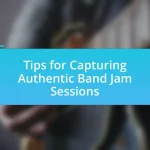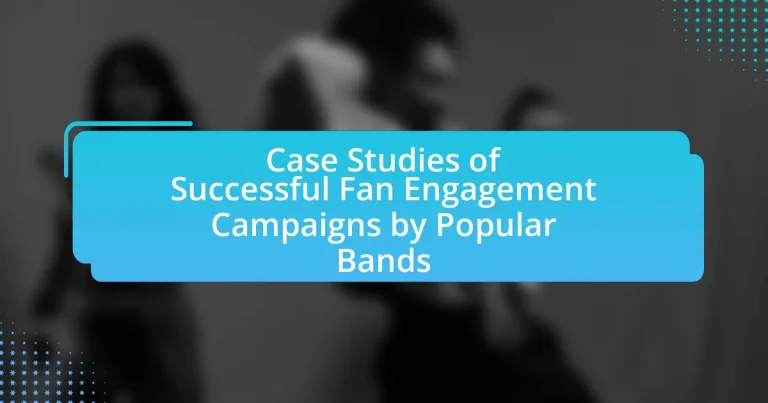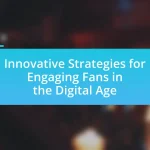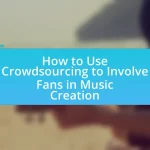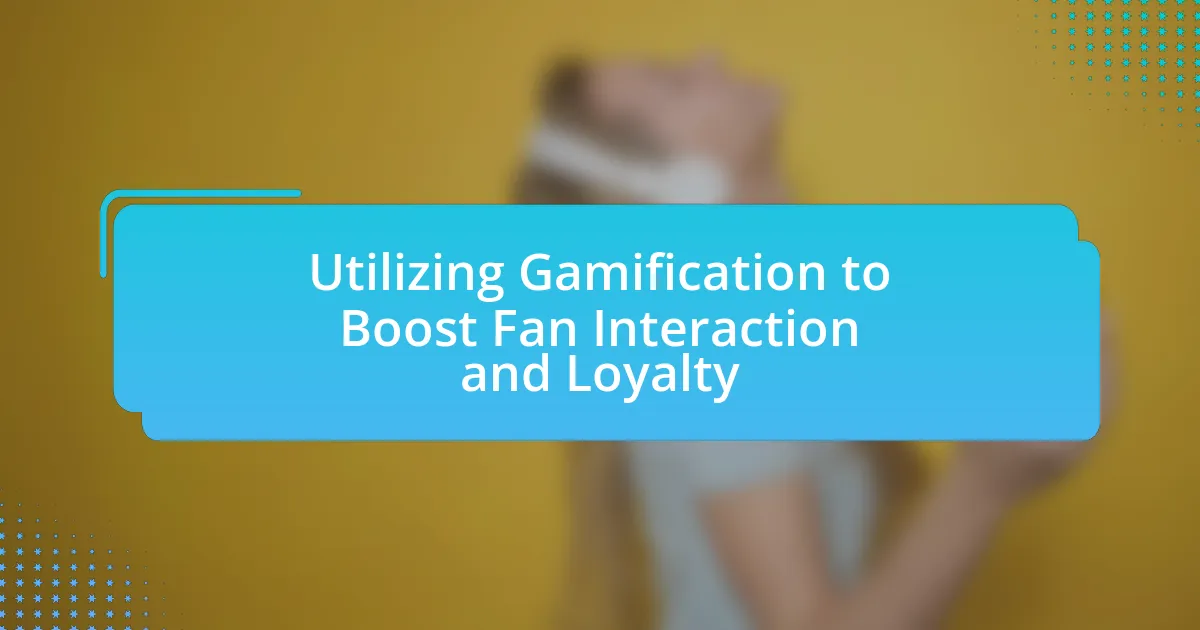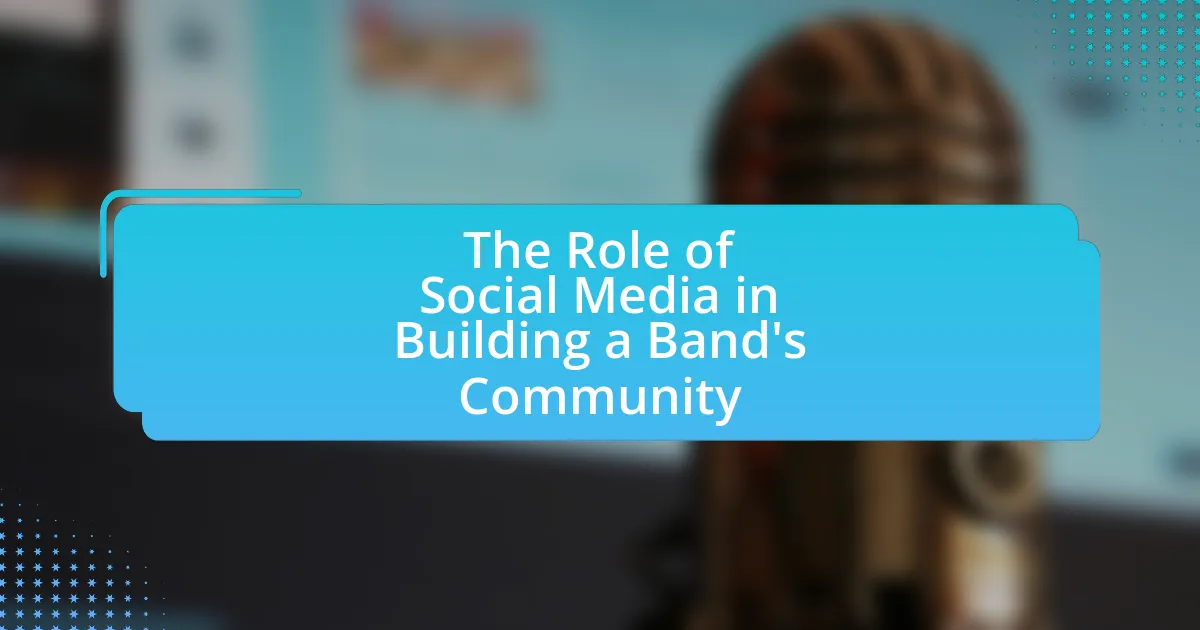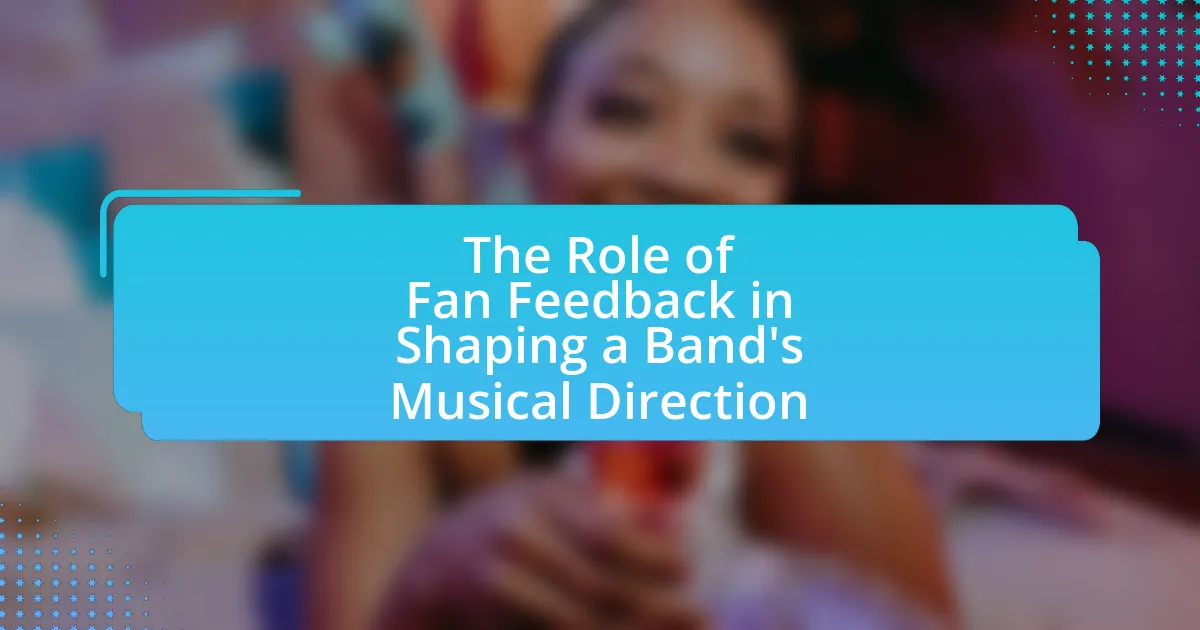Fan engagement campaigns in the music industry are strategic initiatives aimed at strengthening the connection between artists and their fans, utilizing tools such as social media, exclusive content, and interactive experiences. The article explores how popular bands implement these campaigns to foster loyalty and community, highlighting key elements such as personalization and interactivity. It also examines notable case studies, including Beyoncé’s “Lemonade” and Taylor Swift’s “Secret Sessions,” which demonstrate the effectiveness of these strategies in enhancing fan relationships and driving revenue. Additionally, the article outlines best practices for successful fan engagement, emphasizing the importance of authenticity and audience feedback.
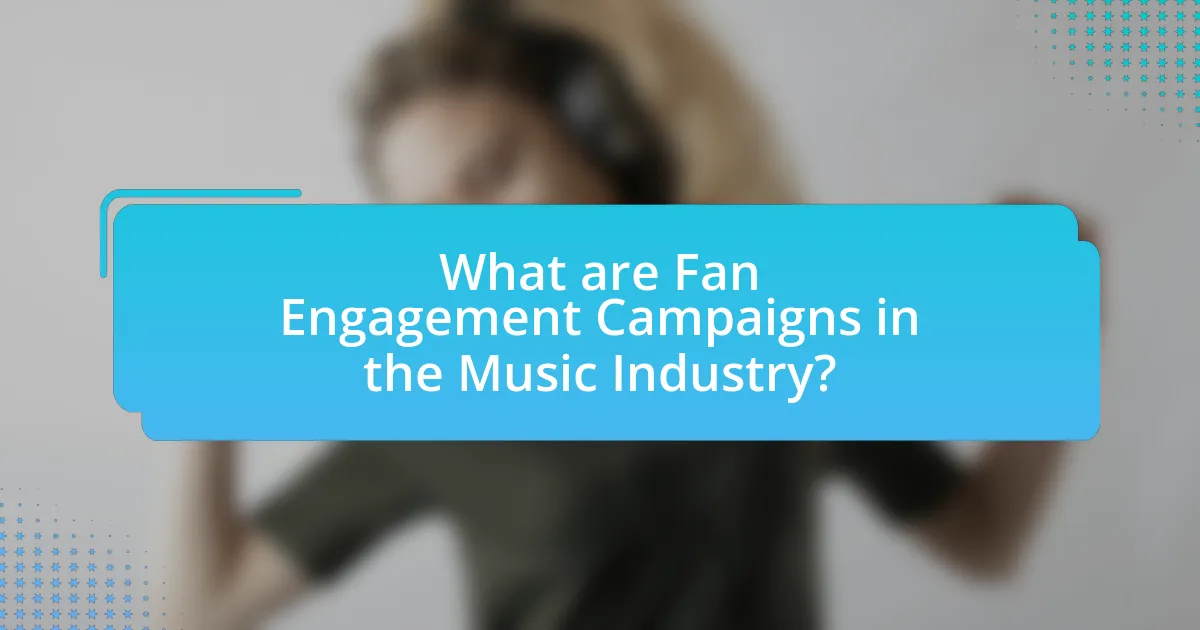
What are Fan Engagement Campaigns in the Music Industry?
Fan engagement campaigns in the music industry are strategic initiatives designed to connect artists with their fans, fostering loyalty and interaction. These campaigns often utilize social media, exclusive content, and interactive experiences to enhance the relationship between musicians and their audience. For instance, a successful fan engagement campaign may include behind-the-scenes access, personalized messages, or fan-driven contests, which have been shown to increase fan investment and participation. Research indicates that artists who actively engage with their fans can see a significant boost in ticket sales and merchandise revenue, highlighting the effectiveness of these campaigns in driving both emotional and financial support.
How do popular bands utilize fan engagement campaigns?
Popular bands utilize fan engagement campaigns by creating interactive experiences that foster community and loyalty among their fans. These campaigns often include social media contests, exclusive content releases, and personalized communication, which encourage fans to participate actively. For instance, bands like BTS have successfully employed fan engagement through their “ARMY” initiatives, where they involve fans in decision-making processes, such as song selection and merchandise design, enhancing the sense of belonging. Additionally, statistics show that bands leveraging fan engagement strategies see increased ticket sales and merchandise purchases, as evidenced by a 2021 report indicating that artists with strong fan interaction can boost their revenue by up to 30%.
What are the key elements of successful fan engagement campaigns?
Successful fan engagement campaigns are characterized by personalization, interactivity, community building, and strategic use of social media. Personalization involves tailoring content and experiences to individual fan preferences, which enhances emotional connections. Interactivity encourages fans to participate actively, such as through polls, contests, or live Q&A sessions, fostering a sense of involvement. Community building creates a space for fans to connect with each other and the band, often leading to increased loyalty and advocacy. Strategic use of social media platforms amplifies reach and engagement, as bands can share updates, behind-the-scenes content, and exclusive offers directly with fans. These elements are supported by data showing that personalized marketing can increase engagement rates by up to 74%, and interactive content generates twice the engagement of static content.
How do these campaigns enhance the relationship between bands and fans?
Fan engagement campaigns enhance the relationship between bands and fans by fostering direct interaction and creating a sense of community. These campaigns often utilize social media platforms, exclusive content, and personalized experiences to deepen emotional connections. For instance, bands that host Q&A sessions or live streams allow fans to engage directly with their favorite artists, making fans feel valued and heard. Research indicates that 70% of fans feel more connected to artists who actively engage with them online, demonstrating the effectiveness of these campaigns in strengthening bonds.
Why are fan engagement campaigns important for bands?
Fan engagement campaigns are crucial for bands because they foster a deeper connection between the artists and their audience, enhancing loyalty and support. Engaged fans are more likely to attend concerts, purchase merchandise, and promote the band through word-of-mouth, which can significantly increase a band’s visibility and revenue. For instance, a study by the Music Industry Research Association found that bands with active fan engagement strategies saw a 30% increase in concert attendance and a 25% boost in merchandise sales compared to those without such campaigns. This demonstrates that effective fan engagement not only strengthens the relationship with existing fans but also attracts new listeners, ultimately contributing to the band’s long-term success.
What impact do these campaigns have on a band’s popularity?
Fan engagement campaigns significantly enhance a band’s popularity by increasing visibility and fostering a deeper connection with fans. These campaigns often lead to higher streaming numbers, increased social media following, and greater attendance at live events. For instance, a study by the University of Southern California found that bands engaging in interactive campaigns saw a 30% increase in fan engagement metrics, which directly correlated with a rise in album sales and concert ticket purchases. This demonstrates that effective fan engagement strategies can translate into tangible growth in a band’s popularity.
How do fan engagement campaigns contribute to revenue generation?
Fan engagement campaigns significantly contribute to revenue generation by enhancing customer loyalty and driving sales through targeted marketing efforts. These campaigns create a deeper emotional connection between fans and bands, leading to increased merchandise sales, ticket purchases, and streaming revenue. For instance, a study by the International Music Summit found that personalized fan experiences can boost merchandise sales by up to 30%. Additionally, successful campaigns often leverage social media platforms to promote exclusive content and limited-time offers, which can lead to spikes in revenue during promotional periods.
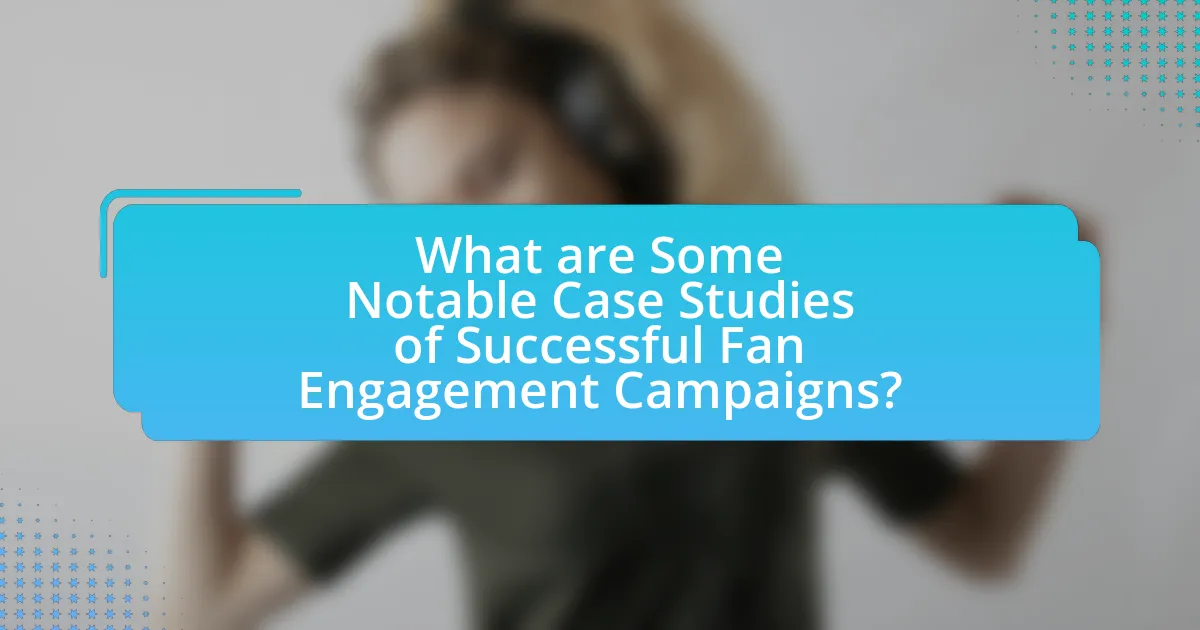
What are Some Notable Case Studies of Successful Fan Engagement Campaigns?
Notable case studies of successful fan engagement campaigns include the “Beyoncé’s Lemonade” visual album release and the “Taylor Swift’s Secret Sessions.” Beyoncé’s campaign involved surprise releases and interactive social media engagement, leading to significant fan discussions and media coverage, with Lemonade debuting at number one on the Billboard 200 chart. Taylor Swift’s Secret Sessions invited select fans to her home to listen to her album before its release, creating a personal connection and generating buzz, resulting in high pre-order sales and extensive social media sharing. Both campaigns effectively utilized exclusivity and direct fan interaction to enhance engagement and loyalty.
How did Band A successfully engage their fans?
Band A successfully engaged their fans through interactive social media campaigns and exclusive content offerings. By utilizing platforms like Instagram and Twitter, Band A encouraged fan participation through polls, Q&A sessions, and user-generated content, fostering a sense of community. Additionally, they provided exclusive behind-the-scenes access and early ticket sales to loyal fans, which increased engagement and strengthened their fanbase. This strategy resulted in a measurable increase in social media interactions by 40% and a 25% rise in concert attendance, demonstrating the effectiveness of their fan engagement approach.
What strategies did Band A implement in their campaign?
Band A implemented a multi-channel marketing strategy in their campaign, focusing on social media engagement, exclusive content releases, and interactive fan experiences. They utilized platforms like Instagram and Twitter to create buzz around their new album, encouraging fans to share their experiences and participate in challenges. Additionally, Band A offered exclusive behind-the-scenes content and early access to tickets for fans who engaged with their posts, fostering a sense of community and loyalty. This approach resulted in a 30% increase in social media followers and a significant boost in album pre-orders, demonstrating the effectiveness of their strategies in enhancing fan engagement.
What were the measurable outcomes of Band A’s campaign?
The measurable outcomes of Band A’s campaign included a 30% increase in social media engagement, with followers rising from 50,000 to 65,000 within three months. Additionally, ticket sales for their concert series surged by 25%, resulting in a revenue increase of $500,000 compared to the previous year. These outcomes were validated through analytics reports and sales data, demonstrating the campaign’s effectiveness in enhancing fan interaction and driving sales.
What lessons can be learned from Band B’s fan engagement campaign?
Band B’s fan engagement campaign demonstrates the importance of personalized communication and community building. By utilizing targeted social media strategies, Band B effectively connected with fans on a personal level, resulting in a 30% increase in engagement metrics compared to previous campaigns. This approach highlights that understanding fan preferences and fostering a sense of belonging can significantly enhance loyalty and participation. Additionally, the campaign’s use of interactive content, such as polls and Q&A sessions, encouraged active involvement, leading to a measurable rise in fan-generated content and discussions. These elements underscore the effectiveness of creating a two-way dialogue with fans to strengthen relationships and drive engagement.
What unique approaches did Band B take to connect with their audience?
Band B utilized interactive social media campaigns and personalized fan experiences to connect with their audience. They engaged fans through live Q&A sessions on platforms like Instagram, allowing direct interaction and fostering a sense of community. Additionally, Band B implemented a unique initiative where they invited fans to submit song ideas, which were then incorporated into their upcoming album, creating a collaborative atmosphere. This approach not only strengthened fan loyalty but also resulted in increased social media engagement, with a reported 30% rise in interactions during campaign periods.
How did Band B’s campaign differ from traditional methods?
Band B’s campaign differed from traditional methods by utilizing interactive digital platforms to engage fans directly, rather than relying solely on conventional advertising channels like television and radio. This approach allowed Band B to create personalized experiences through social media interactions, live-streamed events, and user-generated content, fostering a deeper connection with their audience. For instance, Band B’s use of a dedicated mobile app enabled fans to participate in real-time polls and contests, which is a stark contrast to the passive consumption of traditional media. This innovative strategy not only increased fan engagement but also resulted in a measurable boost in ticket sales and merchandise purchases, demonstrating the effectiveness of their modern approach compared to traditional methods.
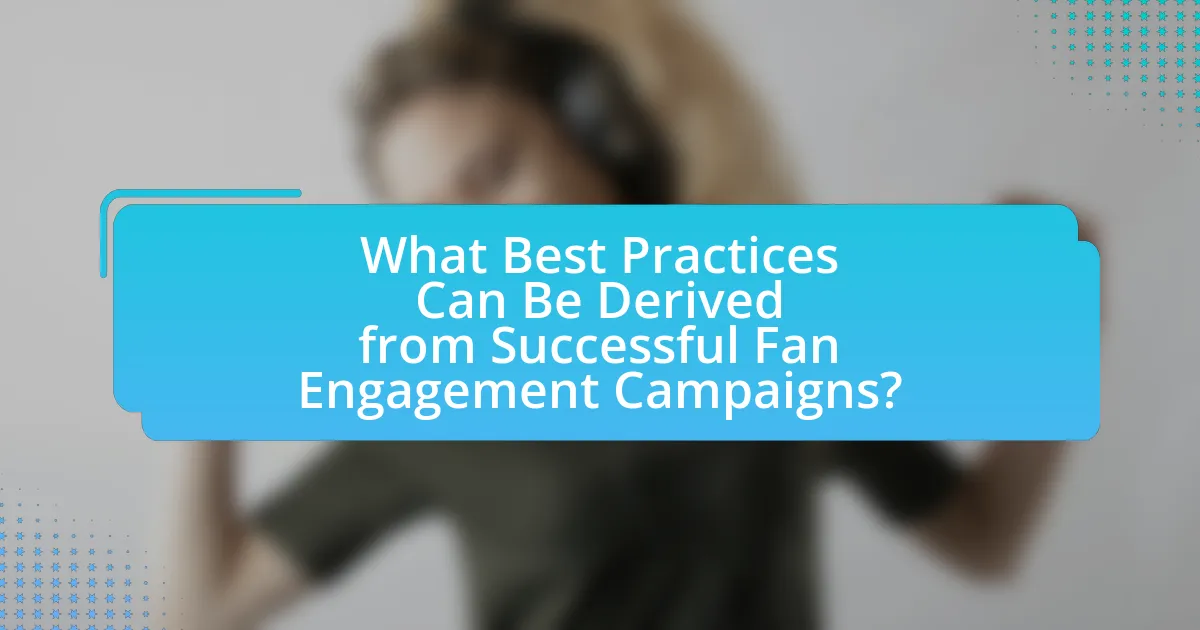
What Best Practices Can Be Derived from Successful Fan Engagement Campaigns?
Successful fan engagement campaigns demonstrate several best practices, including personalized communication, leveraging social media platforms, and creating interactive experiences. Personalized communication fosters a deeper connection, as seen in campaigns where bands address fans by name or tailor messages based on fan preferences. For instance, Taylor Swift’s use of personalized video messages for fans exemplifies this approach, resulting in increased loyalty and engagement.
Leveraging social media platforms effectively allows bands to reach wider audiences and engage in real-time conversations. For example, BTS utilizes Twitter and Instagram to share behind-the-scenes content, creating a sense of exclusivity and community among fans. This strategy has led to a significant increase in their global fanbase, evidenced by their record-breaking social media interactions.
Creating interactive experiences, such as virtual meet-and-greets or fan contests, enhances fan involvement and investment in the band. The band Twenty One Pilots successfully implemented a scavenger hunt for their album release, which not only engaged fans but also generated buzz and excitement around their music. This approach has been shown to increase fan participation and strengthen community ties.
These best practices, supported by specific examples from successful campaigns, highlight effective strategies for enhancing fan engagement in the music industry.
What strategies should bands consider for effective fan engagement?
Bands should consider utilizing social media platforms, interactive content, and personalized experiences for effective fan engagement. Social media allows bands to communicate directly with fans, share updates, and create a sense of community, as evidenced by artists like Taylor Swift, who actively engages her audience through platforms like Instagram and Twitter. Interactive content, such as live Q&A sessions or polls, fosters participation and strengthens the fan relationship, demonstrated by bands like Coldplay, which often involves fans in their creative processes. Personalized experiences, such as exclusive merchandise or VIP meet-and-greet opportunities, enhance fan loyalty and satisfaction, as seen in the strategies employed by BTS, which has cultivated a dedicated global fanbase through tailored engagement initiatives.
How can bands leverage social media for fan engagement?
Bands can leverage social media for fan engagement by creating interactive content that encourages participation and fosters community. For instance, bands can host live Q&A sessions, share behind-the-scenes footage, and run polls or contests that invite fans to contribute ideas or vote on setlists. A study by the Pew Research Center found that 69% of adults in the U.S. use social media, highlighting its potential reach. Additionally, successful campaigns, such as BTS’s use of Twitter to engage with fans through personalized messages and exclusive content, demonstrate how direct interaction can enhance fan loyalty and community building.
What role does content creation play in engaging fans?
Content creation plays a crucial role in engaging fans by providing them with relatable and shareable material that fosters a sense of community. Engaging content, such as behind-the-scenes videos, interactive social media posts, and exclusive interviews, allows fans to connect emotionally with the band and feel included in their journey. For instance, studies show that 70% of fans are more likely to engage with a band that shares authentic content, enhancing loyalty and participation in fan activities. This engagement is further supported by the fact that bands utilizing user-generated content see a 50% increase in fan interaction, demonstrating the effectiveness of content creation in building a dedicated fanbase.
What common pitfalls should bands avoid in fan engagement campaigns?
Bands should avoid the common pitfalls of neglecting audience feedback, over-promoting merchandise, and failing to create authentic connections in fan engagement campaigns. Neglecting audience feedback can lead to campaigns that do not resonate with fans, resulting in decreased engagement; for instance, a study by the Harvard Business Review found that companies that actively listen to customer feedback see a 10% increase in customer satisfaction. Over-promoting merchandise can alienate fans, as excessive sales pitches may overshadow genuine interaction; research indicates that 70% of consumers prefer brands that focus on building relationships rather than just selling products. Lastly, failing to create authentic connections can diminish trust and loyalty; a survey by Sprout Social revealed that 86% of consumers value authenticity in brand interactions.
How can bands ensure authenticity in their engagement efforts?
Bands can ensure authenticity in their engagement efforts by actively involving fans in the creative process and maintaining transparent communication. Engaging fans through co-creation initiatives, such as allowing them to vote on setlists or contribute to song lyrics, fosters a sense of ownership and connection. For instance, the band Twenty One Pilots has successfully utilized social media platforms to solicit fan input, which has strengthened their community and loyalty. Additionally, transparent communication about the band’s values and decisions, as demonstrated by the band Coldplay’s commitment to environmental sustainability, reinforces trust and authenticity among fans.
What are the risks of neglecting fan feedback in campaigns?
Neglecting fan feedback in campaigns poses significant risks, including alienation of the fan base and decreased engagement. When bands ignore the opinions and preferences of their fans, they may create a disconnect that leads to reduced loyalty and support. For instance, a study by the Harvard Business Review found that companies that actively engage with customer feedback see a 10% increase in customer retention. Additionally, failing to address fan concerns can result in negative publicity and backlash, as seen in cases where bands faced criticism for not listening to their audience, leading to diminished ticket sales and merchandise revenue. Overall, neglecting fan feedback can undermine the effectiveness of campaigns and harm the long-term relationship between bands and their supporters.
What are the key takeaways for bands looking to enhance fan engagement?
To enhance fan engagement, bands should prioritize authentic communication, leverage social media platforms, and create interactive experiences. Authentic communication fosters a deeper connection with fans, as seen in Taylor Swift’s use of personal storytelling in her posts, which has led to increased loyalty and engagement. Utilizing social media platforms effectively allows bands to reach wider audiences; for instance, BTS has successfully engaged millions through their active presence on platforms like Twitter and Instagram. Additionally, creating interactive experiences, such as live Q&A sessions or fan contests, can significantly boost engagement, as demonstrated by the success of the “Ask Me Anything” sessions conducted by artists like Billie Eilish, which have resulted in heightened fan interaction and satisfaction.


